First Divorce Rate, 2021
Family Profile No. 18, 2023
Author: Krista K. Westrick-Payne
In 2021, the overall U.S. divorce rate remained low at 14.0 divorces per 1,000 married women–the lowest since 1970 (Marino, 2022). However, the overall divorce rate includes divorces from both first marriages and higher-order marriages. It is important to examine the first divorce rate separately, because first marriages are less likely to end in divorce than remarriages (Cohen, 2016). Additionally, the traditional estimation of marriage and divorce rates has been restricted to marriages and divorces among the female population, but recognizing possible sex differences this profile provides separate estimates for both males and females using U.S Census data from the American Community Survey provided by IPUMS-USA. More specifically, we examine the first divorce rate (defined as the number of first marriages that ended in divorce per 1,000 first marriages) among first married males and females aged 18 years and older. This Family Profile is an update to previous profiles on the first divorce rate (FP-21-10, FP-20-02, FP-18-15, FP-16-19, FP-14-09, FP-11-09, and FP-10-06).
Trends in the First Divorce Rate for Males and Females
- The first divorce rate has decreased overall since 2008, from 16.9 divorces per 1,000 males in a first marriage to 11.8 divorces per 1,000 males in a first marriage in 2021. Among females, it decreased from 18.7 in 2008 to 12.9 in 2021.
- An estimated 624,790 males and 682,372 females experienced a first divorce in 2021.
Figure 1. First Divorce Rate for Males and Females, 2008–2021
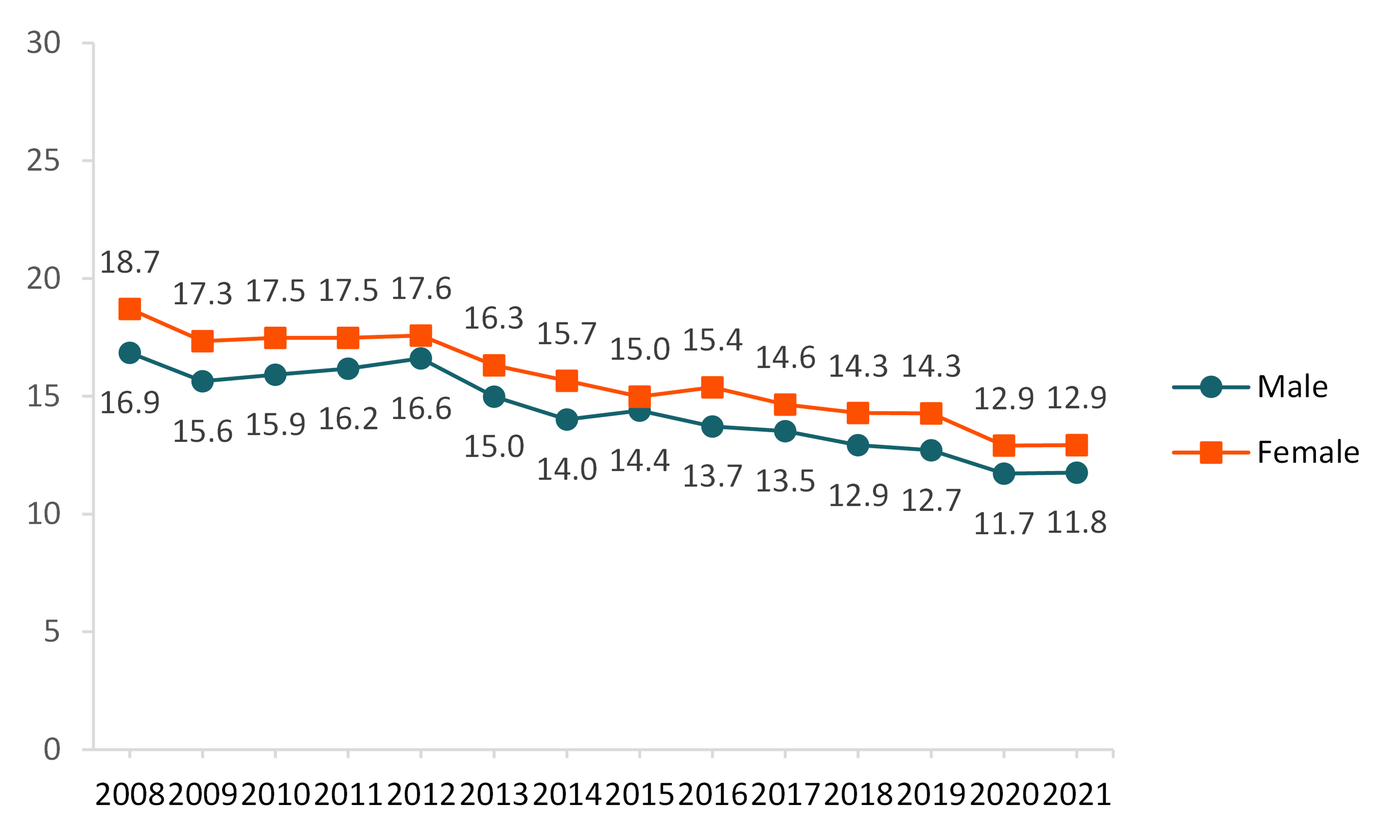
First Divorce Rate by Age for Males and Females
- Generally, as age increases the rate of first divorce decreases.
- The highest first divorce rates were among those aged 18 to 29 with 18.5 per 1,000 married males and 19.9 per 1,000 married females experiencing a first divorce in 2021.
- The lowest first divorce rate were observed among those aged 75 and older (5.0 males and 5.7 females per 1,000 married). An estimated 10,614 males and 13,285 females aged 75 and older in the United States experienced a first divorce in 2021.
Figure 2. First Divorce Rate for Males and Females 18 and Older by Age, 2021
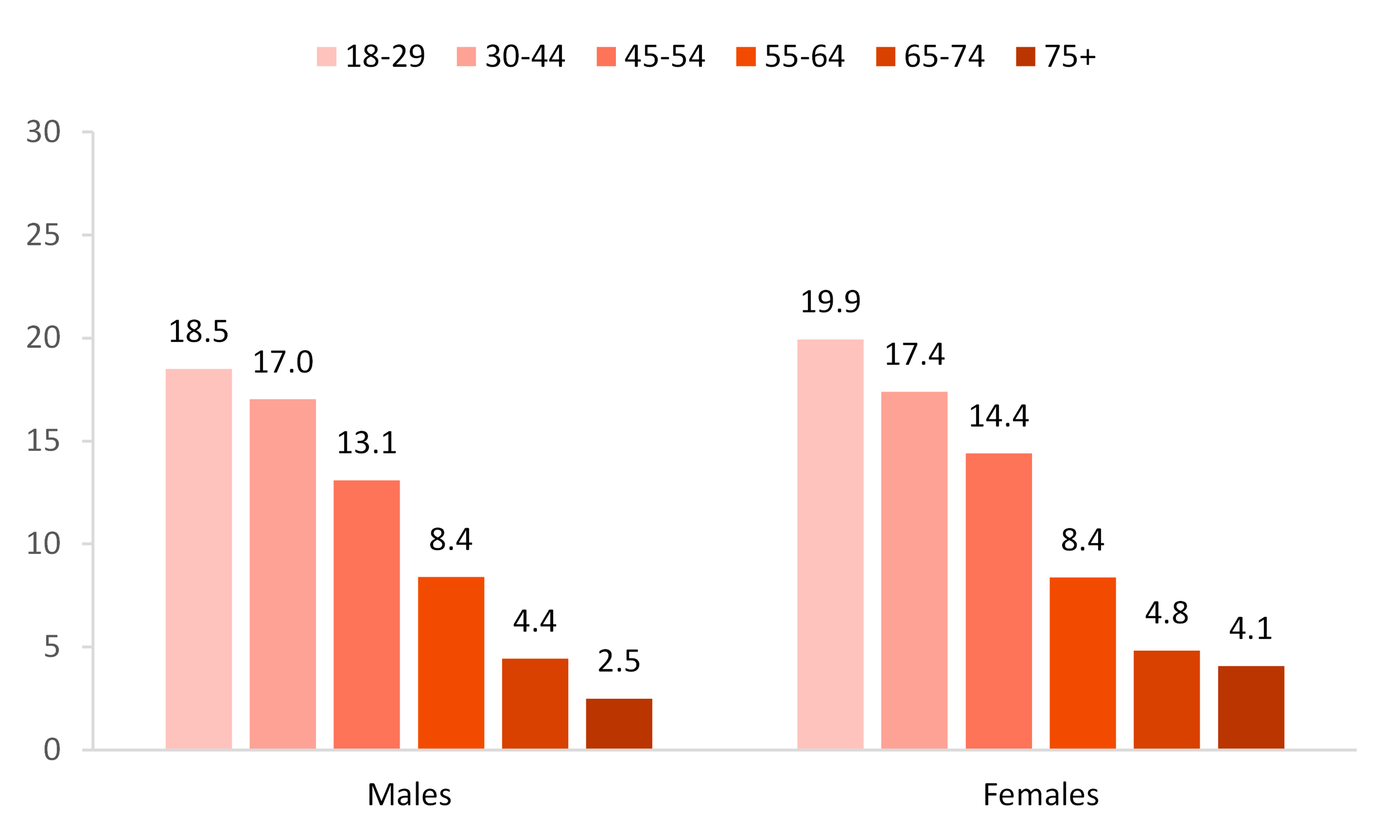
First Divorce Rate by Race, Ethnicity, and Nativity for Males and Females
- In 2021, Black females and Black males experienced the highest first divorce rates (24.5 and 22.6, respectively).
- Asian males and females had the lowest first divorce rates (7.7 and 8.3, respectively).
- While most females had higher first divorce rates than their same race/ethnic male counterparts, this was not the case among those categorized as “Other,” for whom the first divorce rate for males was 16.4 and for females it was 14.6.
- Native-born males and females have higher first divorce rates than their native counterparts (see Figure 4). This was the case for each racial/ethnic group examined, except among Black males for whom the first divorce rate of foreign-born males was higher than that of native-born males (25.7 versus 24.0, not shown).
Figure 3. First Divorce Rate for Males and Females 18 and Older by Race and Ethnicity, 2021
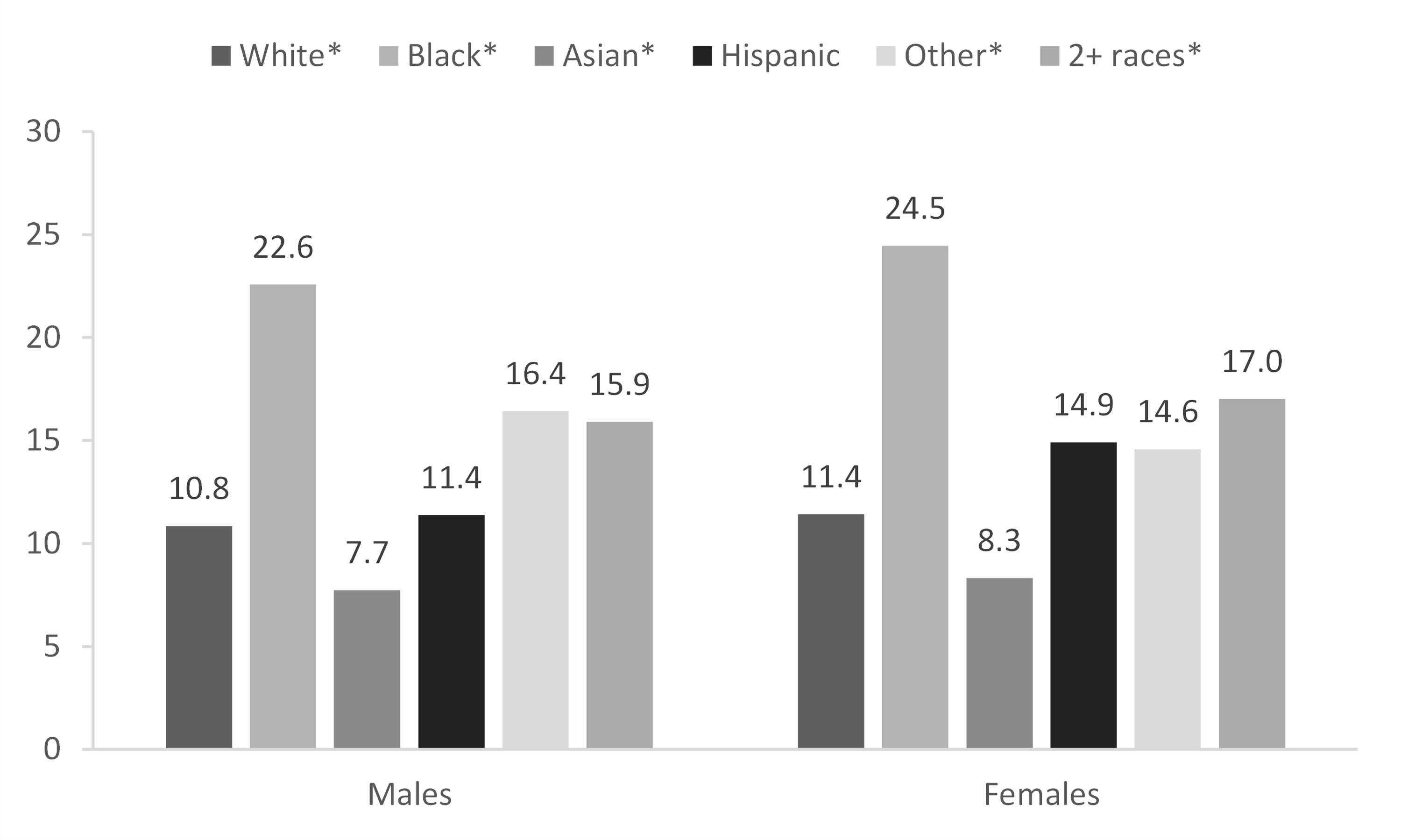
Figure 4. First Divorce Rate for Males and Females 18 and Older by Nativity, 2021
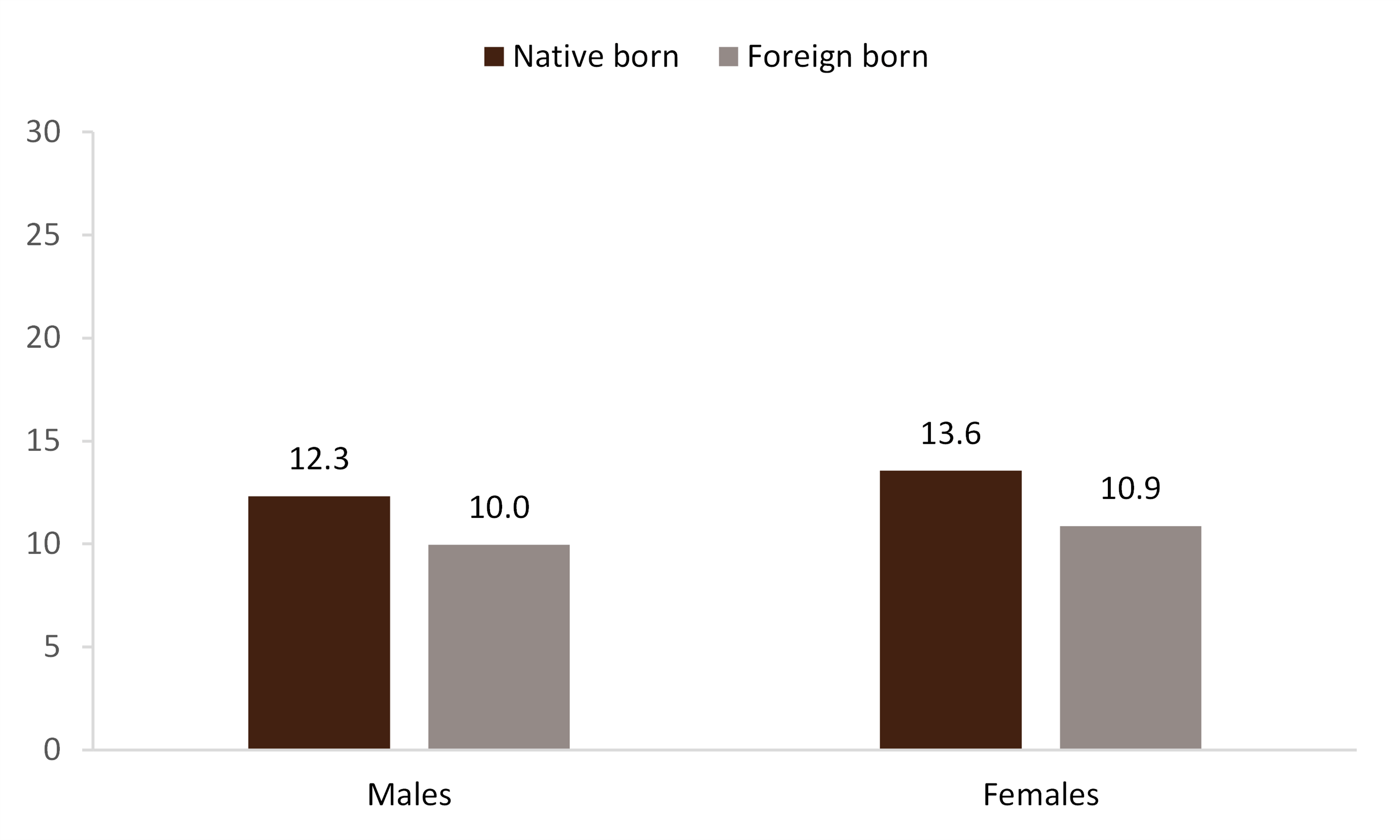
First Divorce Rate by Educational Attainment for Males and Females
- Patterns of first divorce by educational attainment differed slightly between males and females in 2021. Although the lowest divorce rates were among those with the highest educational attainment regardless of sex, there were differences in the group who experienced the highest divorce rate.
- Among males who had at least a master’s degree, 7.8 per 1,000 in a first marriage experienced a divorce. Among their female counterparts, 10.2 per 1,000 first divorced in 2021.
- The highest first divorce rate among males was among those with a high-school level of education (15.1), whereas among females it was among those with some college education, but no degree (16.4).
Figure 5. First Divorce Rate for Males and Females 18 and Older by Educational Attainment, 2021
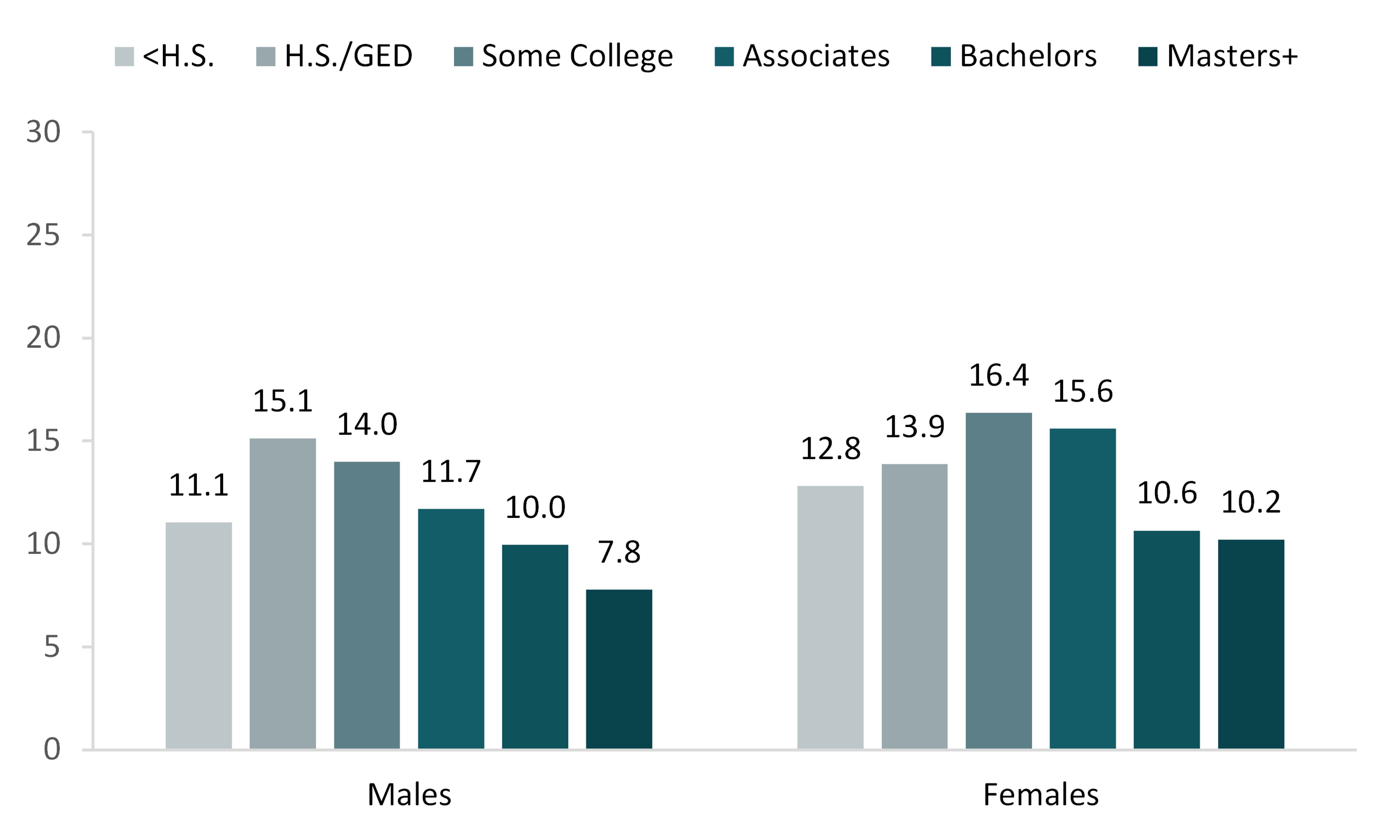
Data Source:
Ruggles, S., Flood, S., Sobek, M., Brockman D., Cooper, G., Richards, S., Schouweiler, M. (2023). IPUMS USA: Version 13.0 [dataset]. Minneapolis, MN: IPUMS. https://doi.org/10.18128/D010.V12.0
References:
Allred, C. & Schweizer, V. J. (2020). First Divorce Rate in the U.S., 2018. Family Profiles, FP-20-02. Bowling Green, OH: National Center for Family & Marriage Research. https://doi.org/10.25035/ncfmr/fp-20-02
Anderson, L. R. (2016). First divorce rate in the U.S., 2014. Family Profiles, FP-16-19. Bowling Green, OH: National Center for Family & Marriage Research. https://www.bgsu.edu/ncfmr/resources/data/family-profiles/anderson-first-divorce-rate-2014-fp-16-19.html
Cohen, P. N. (2016). Multiple-decrement life tables from 2010-2012 American Community Survey data marital events. Retrieved from https://familyinequality.wordpress.com/2016/06/08/life-table-says-divorce-rate-is-52-7/
Gibbs, L. & Payne, K. K. (2011). First divorce rate, 2010. Family Profiles, FP-11-09. Bowling Green, OH: National Center for Family & Marriage Research. http://www.bgsu.edu/content/dam/BGSU/college-of-arts-and-sciences/NCFMR/documents/FP/FP-11-09.pdf
Payne, K. K. (2011). First divorces in the U.S., 2008. Family Profiles, FP-10-06. Bowling Green, OH: National Center for Family & Marriage Research. http://www.bgsu.edu/content/dam/BGSU/college-of-arts-and-sciences/NCFMR/documents/FP/FP-10-06.pdf
Payne, K. K. (2018). First divorce rate in the U.S., 2016. Family Profiles, FP-18-15. Bowling Green, OH: National Center for Family & Marriage Research. https://doi.org/10.25035/ncfmr/fp-18-15
Marino, F. (2022). Divorce rate in the U.S.: Geographic variation, 2021. Family Profiles, FP-22-26. Bowling Green, OH: National Center for Family & Marriage https://doi.org/10.25035/ncfmr/fp-22-26
Reynolds, L. (2021). First divorce rate in the U.S., 2019. Family Profiles, FP-21-10. Bowling Green, OH: National Center for Family & Marriage Research. https://doi.org/10.25035/ncfmr/fp-21-10
Stykes, B., Gibbs, L., & Payne, K. K. (2014). First divorce rate, 2012. Family Profiles, FP-14-09. Bowling Green, OH: National Center for Family & Marriage Research. https://www.bgsu.edu/content/dam/BGSU/college-of-arts-and-sciences/NCFMR/documents/FP/FP-14-09-divorce-rate-2012.pdf
Suggested Citation:
Westrick-Payne, K. K. (2023). First divorce rate, 2021. Family Profiles, FP-23-18. National Center for Family & Marriage Research. https://doi.org/10.25035/ncfmr/fp-23-18
Updated: 11/12/2025 09:56AM

